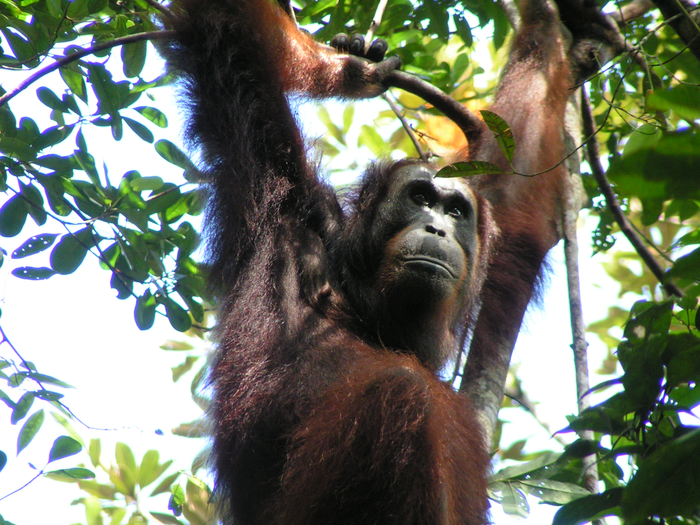Social mingling shapes and transforms the ‘vocabularies’ of apes, just like in humans, according to new research led by the University of Warwick.

Credit: Madeleine E. Hardus
Social mingling shapes and transforms the ‘vocabularies’ of apes, just like in humans, according to new research led by the University of Warwick.
In a paper published by Nature Ecology and Evolution, researchers have proved that wild orangutans demonstrate distinct ‘vocal personalities’ that are moulded depending on the social groups in which individuals live and communicate — as opposed to a fixed repertoire of instinctive, automated calls as traditionally presumed.
This breakthrough, led by Dr Adriano R. Lameira from Warwick’s Department of Psychology, further establishes a direct developmental vocal continuum between us and our evolutionary ancestors.
Living alongside orangutan communities in the swamps and low rainforests of Borneo and Sumatra in Southeast Asia, Dr Lameira and his research team recorded the calls of around 70 individual apes across six populations (the largest sample ever analysed in this type of study on the vocal behaviour of great apes).
The orangutan populations differed naturally in population density, from groups that socialised intensely to those that were more dispersed. In high-density populations, the orangutans communicated using a large variety of original calls, trying out lots of novel sound variants that were continually modified or dropped.
By contrast, the orangutans in sparser, lower density populations favoured more established, conventional calls. While these more dispersed groups did not experiment with such a huge number of novel sounds, when they did introduce a new call variant, they kept it, and therefore their call repertoire was richer that orangutans in high-density populations who continuous discard new call variants.
If orangutan call communication is socially shaped, then this was also likely the case with our direct, extinct ape-like ancestors. Social influence —though predictably modest at first before the rise of a fully operational primitive language — could have then increased steadily, ultimately leading to the myriad ways in which language is determined by those who surround us.
Dr Adriano R. Lameira, lead author and Assistant Professor at the University of Warwick’s Department of Psychology, commented:
“Great apes, both in the wild and captivity, are finally helping us to resolve one of the longest-standing puzzles in science – the origin and evolution of language. We can now start conceiving of a gradual path that likely led to the rise of the talking ape, us, instead of having to attribute our unique verbal skills and advanced cognition to divine intervention or random genetic jackpot.
“Many more clues await us in the lives of our closest living relatives, as long as we manage to guarantee their protection and their preservation in the wild. Each disappearing population will take with it unretrievable glimpses of the evolutionary history of our species.”
Notes to editors:
The paper, ‘Sociality predicts orangutan vocal phenotype’ is published in Nature Ecology and Evolution.
DOI: 10.1038/s41559-022-01689-z
https://www.nature.com/articles/s41559-022-01689-z
Journal
Nature Ecology & Evolution
DOI
10.1038/s41559-022-01689-z
Method of Research
Observational study
Subject of Research
Animals
Article Title
Sociality predicts orangutan vocal phenotype
Article Publication Date
21-Mar-2022




